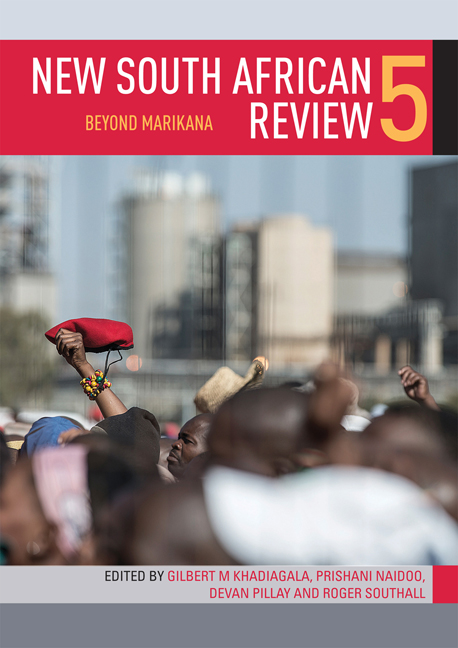Book contents
- Frontmatter
- Contents
- Preface
- Introduction: Political reconfigurations in the wake of Marikana
- PART 1 NEW POLITICAL DIRECTIONS?
- PART 2 ECONOMY, ECOLOGY AND LABOUR
- PART 3 STATE AND SOCIETY
- Introduction to Part 3
- Chapter 8 Constitutionalism: An ‘unqualified human good’?
- Chapter 9 People's Parliament? Do citizens influence South Africa's legislatures?
- Chapter 10 Corruption
- Chapter 11 Marikana and the politics of public order policing
- Chapter 12 ‘In December we are rich, in January we are poor’: Consumption, saving, stealing and insecurity in the kasi
- PART 4 SOUTH AFRICA IN THE INTERNATIONAL ARENA
- Contributors
- Index
Introduction to Part 3
from PART 3 - STATE AND SOCIETY
Published online by Cambridge University Press: 21 April 2018
- Frontmatter
- Contents
- Preface
- Introduction: Political reconfigurations in the wake of Marikana
- PART 1 NEW POLITICAL DIRECTIONS?
- PART 2 ECONOMY, ECOLOGY AND LABOUR
- PART 3 STATE AND SOCIETY
- Introduction to Part 3
- Chapter 8 Constitutionalism: An ‘unqualified human good’?
- Chapter 9 People's Parliament? Do citizens influence South Africa's legislatures?
- Chapter 10 Corruption
- Chapter 11 Marikana and the politics of public order policing
- Chapter 12 ‘In December we are rich, in January we are poor’: Consumption, saving, stealing and insecurity in the kasi
- PART 4 SOUTH AFRICA IN THE INTERNATIONAL ARENA
- Contributors
- Index
Summary
Two decades after the demise of apartheid, there is a sense abroad that our democracy is failing. The appalling tragedy at Marikana in August 2012, when thirty-four protesting miners were gunned down by police, drove home a conviction in many people's minds that although the book of South Africa was still being sold with a bright and shiny new cover the contents were very much the same, telling the tale of huge disparities of wealth, of gross inequities of class and race, and of an oppressive state that favoured a fortunate few.
The rise of Jacob Zuma to the presidency upon the crest of populist revolt within the African National Congress (ANC) and Tripartite Alliance against the distant, authoritarian and technocratic rule of Thabo Mbeki was an indicator of discontent with the state of democracy. Yet whereas Zuma's presidency was heralded by its proponents as destined to inaugurate a new era of social justice and redistribution, today few would challenge the view that it has proved an unmitigated disaster.
Instead of radical change, the country has lost all sense of direction: the economy is floundering; the political arena increasingly mimics a circus; a paranoically defensive ANC repudiates all opposition attempts to hold the executive to account; Zuma himself displays gross contempt for Parliament, parrying all attempts to hold him accountable for unreasonable state expenditure upon his private Nkandla home; key state institutions are being torn apart by factionalism and infighting and parastatals – the mooted vanguard of the ANC's ‘developmental state’ – are not only sites of vicious internal political battles, but propped up by recurrent state bail-outs and are unable to fulfil their mandates. No wonder then, that in the wake of Marikana politics has taken an increasingly shrill and raucus turn, expressed most theatrically by the Economic Freedom Fighters (EFF) having burst so rudely upon the scene. It may be that, in substance, the EFF is the ANC Youth League in drag, having appropriated its populist repertoires and Africanistcum- nationalist policies as Julius Malema had developed them before he fell out with Zuma, and was expelled from the ruling party.
- Type
- Chapter
- Information
- New South African Review 5Beyond Marikana, pp. 144 - 150Publisher: Wits University PressPrint publication year: 2015



